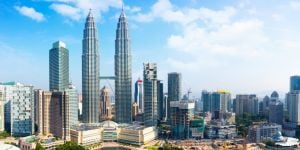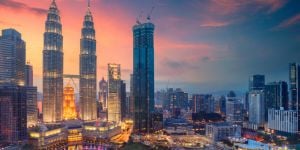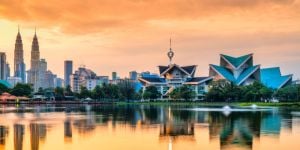
With Malaysia's unique blend of stunning beaches, vibrant cities, a rich mix of Malay, Chinese, Indian and European culture and a rapidly developing economy, it comes as no surprise that the country is a popular choice for expats.
Whether you are considering your options or have already made the decision about relocating to Malaysia to live and work, here are ten things to note about the country's healthcare services.
Public healthcare in Malaysia
While Malaysia does not have a national health service per se, it does have a system in place to subsidise rates for medical treatment. The public healthcare is governed by the Ministry of Health and is funded jointly by the state, employers, and residents. While the public healthcare in state-owned facilities is easily available across most areas of Malaysia, many expats choose a combination of public and private healthcare, to ensure they receive the treatment and service they need.
Urban vs. rural healthcare
Just like many large countries in Asia, there is a noticeable discrepancy between the quality and availability of healthcare services in rural and urban areas. For instance, in the capital city of Kuala Lumpur there are 9.41 doctors for every 10,000 people, and in some cities, private hospital beds account for 22 percent of total hospital beds. However, in poorer rural areas, there are extreme shortages of public health resources and available hospital beds, but not everyone can afford to travel elsewhere for treatment.
World-class medical facilities
Malaysia is renowned for its high standard of facilities, highly skilled and internationally trained medical professionals, affordable treatments and significant innovations in healthcare. As such, many people travel from around the world to receive treatment (both cosmetic and medical). The country's particular areas of expertise include cardiology, dentistry, ophthalmology, orthopaedics, gastroenterology, and plastic surgery.
Employer medical cover and work permits
Though there is no national healthcare scheme available in Malaysia, it is compulsory for expats to have adequate medical insurance in place. In 2011, the Malaysian government introduced the Foreign Worker Hospitalization and Surgical insurance scheme (FWHS), known in Malaysia as Skim Kemasukan Hospital dan Pembedahan Pekerja Asing (SKHPPA), to help enforce this. Before an employee can be issued with a work permit, the employer must provide them with annual medical cover.
Each employee that is covered by the FWHS gets a fixed amount of medical treatment at government hospitals per year. The insurance covers costs such as ambulance fees, hospital board and lodging, surgery (excluding organ transplants), anaesthetist fees and treatment in the intensive care unit (ICU).
Private insurance in Malaysia
Malaysia does not have reciprocal agreements in place with other countries to fund healthcare, and many employers are willing to pay only for basic health coverage under the FWHS scheme. Expats may, therefore, want to take out personal health insurance. Private facilities are readily available across Malaysia ' in Kuala Lumpur alone there are about 30 private clinics, some of which are open 24 hours a day. Private facilities tend to provide patients with shorter waits and more efficient services.
Healthcare costs
Public healthcare in Malaysia is incredibly affordable in comparison to other countries. For example, a coronary artery bypass might cost USD 6,000 in a public hospital in Malaysia, about USD 10,500 at a private hospital, and probably around USD 13,000 at a hospital in Singapore. For primary care, patients will pay USD 5 for a medical consultation with a doctor or general practitioner (GP), and up to USD 30 for a consultation with a specialist. Though public healthcare is reasonably priced, many expats still opt to go private and pay an out-of-pocket fee, as the service can be better.
Standard of care
Patients in Malaysia benefit from high-quality care that is both affordable and accessible. Many doctors in Malaysia speak English and provide a high standard of medical care. One of the few downsides is that patients sometimes have to endure long waiting times to see a doctor, which is why many expats choose to use private facilities instead.
Medicine and pharmacies
Pharmacies can be found in most shopping centres in Malaysia, and in major cities, these are normally open late. Pharmacies are usually stocked with recognisable brands. One thing expats may need to be aware of is that some medicines requiring a prescription in the UK or US, do not need a prescription in Malaysia. Expats may also bring prescribed medicine into Malaysia in quantity not exceeding that which is reasonably required for one month's use. A declaration is also necessary at customs.
Health risks in Malaysia
There are some health risks in Malaysia that expats may need to consider. One of the most common issues is pollution due to smoke haze, which could cause problems for people with respiratory conditions. There is also the risk of dengue fever, which is transmitted via mosquito bites. Expats may need to consider a vaccination against hepatitis A, hepatitis B, typhoid, yellow fever, and Japanese encephalitis. If in doubt, discuss it with a doctor first.
Emergencies
The universal number to call in a medical emergency in Malaysia is 999. The fees for ambulance services are covered by the FWHS for expats.
Disclaimer: The information included in this communication is provided for information purposes only and it is not intended to constitute professional advice or replace consultation with a qualified medical practitioner.
We do our best to provide accurate and up to date information. However, if you have noticed any inaccuracies in this article, please let us know in the comments section below.











